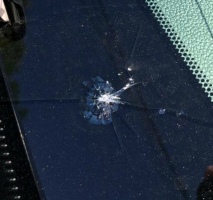— A Subaru windshield class action lawsuit alleges the glass in about 2.5 million vehicles is defective which allows the windshields to crack, chip and break.
But in a motion to dismiss the Subaru windshield class action, lawyers for the automaker say the plaintiffs can't support their claims.
Two lawsuits, Leon v. Subaru and Powell v. Subaru, were consolidated into one class action which includes 16 plaintiffs and these five Subaru models.
- 2017-2020 Subaru Forester
- 2017-2020 Subaru Outback
- 2017-2020 Subaru Crosstrek
- 2017-2020 Subaru Legacy
- 2017-2020 Subaru Impreza
According to the windshield lawsuit, chips and cracks “spontaneously and/or unreasonably" appear from multiple causes.
The plaintiffs blame the cracks on the thickness of the windshield glass and the use of acoustic glass. In addition, the windshields allegedly chip because of the “ceramic materials used for the black-colored printed perimeter [and] the silver-colored material used for the wiper deicer portion of the windshield glass.”
The class action alleges Subaru dealers refuse to repair or replace the windshields even when the vehicles are under their warranties, and sticking customers with the expense can leave some owners unable to pay for repairs.
The plaintiffs also claim replacing the windshields may do no good because Subaru uses the same allegedly defective windshields as the replacement windshields.
Concerning the expense, the class action alleges owners must not only pay for replacement windshields and labor to install them, but dealers must also perform more work due to the EyeSight systems. Those systems are marketed as safety features that help prevent rear-end crashes.
But according to the plaintiffs, cracked and chipped windshields interfere with how the EyeSight systems function. Additionally, owners must pay more because dealer technicians must recalibrate the systems when the windshields are replaced.
In its motion to dismiss the windshield class action, Subaru argues it's the nature of windshields to sometimes suffer damage even when the vehicles are operated normally.
The automaker says the U.S. government regulates windshields based on federal safety standard #205, but the consolidated class action doesn't allege the Subaru vehicles fail to comply with the standard.
Subaru also argues the plaintiffs allege no manufacturing defects and don't allege the automaker or its suppliers failed to manufacture the windshields to design specifications.
Attorneys for Subaru say the plaintiffs lack standing to assert any claims on vehicles which none of the plaintiffs ever purchased, leased or owned. Those models include any model year Subaru Legacy, any 2017 Subaru Crosstrek, Forester, or Impreza, any 2019 Subaru Impreza or any 2020 Subaru Crosstrek, Forester or Impreza.
Saying the "over breadth of vehicles included in the Consolidated Complaint is plain," Subaru argues the vehicles named in the lawsuit not only consist of five different models, but also "two different design generations of four of those five models."
According to attorneys for the automaker:
"The vehicles span the gamut from compact sedans (Impreza) to SUVs (Forester) and the windshields between most of those vehicles have distinct part numbers that are not interchangeable. Thus, there are effectively nine vehicle designs at issue. More importantly, each generation of each model requires a different windshield."
The motion to dismiss alleges that not only do the vehicles involve multiple generations, but Subaru used multiple windshield suppliers for the vehicles and there is no way all of them supplied allegedly defective windshields.
The plaintiffs may allege numerous complaints were made to third parties, but Subaru argues those complaints represent .001% of the owners included in the class action lawsuit.
The automaker also says the express warranty claims set forth by the plaintiffs fail because the new vehicle warranty covers “material[s] or workmanship,” but doesn't cover design defects.
"Plaintiffs premise their express warranty claims solely upon an alleged design defect. It is now well-settled that express warranties covering materials and workmanship—such as SOA’s [Subaru of America's] warranty here—do not cover design defects."
The motion further says five plaintiffs' claims fail because they never allege they gave Subaru an opportunity to repair or replace their windshields. Subaru says the express warranties require the vehicles be presented to authorized Subaru dealerships for warranty repairs.
Two other plaintiffs allegedly didn't provide pre-suit notice to Subaru, which allegedly means their warranty claims fail, and another plaintiff purchased a used vehicle which allegedly means he lacks standing concerning his Song-Beverly Act claim.
According to the class action, Subaru knew the windshields in the named vehicles were allegedly defective because the automaker issued a technical service bulletin (TSB 12-192-15R).
But attorneys for Subaru provided the TSB to the judge and pointed out the Subaru vehicles named in the windshield TSB are not the same vehicles named in the lawsuit.
The automaker also told the judge that for owners who complain about dealers refusing to pay for repairs even when the vehicles are under their warranties, Subaru says the terms are clear.
According to the warranty, it specifically excludes coverage for “any part which malfunctions, fails or is damaged due to objects striking the vehicle, road hazards, whether on or off the road, accident, neglect, abuse, or any other cause beyond the control of SOA.”
The motion says the judge should issue an order dismissing all the claims "for lack of subject matter jurisdiction or for failure to state a claim."
The Subaru windshield class action lawsuit was filed in the U.S. District Court for the District of New Jersey - Powell, et al., v. Subaru of America, Inc.
The plaintiffs are represented by Carlson Lynch, LeVan Law Group, Moon Law APC, and Freed Kanner London & Millen.
CarComplaints.com has complaints from owners of the Subaru vehicles named in the windshield lawsuit.

